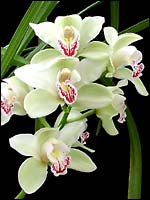Dividing
cymbidiums
 Once
cymbidium orchids have finished flowering it's the best time of
year to tidy them up and prepare them for their new growing season. Once
cymbidium orchids have finished flowering it's the best time of
year to tidy them up and prepare them for their new growing season.
Take a good look at
the orchid and see if the clump is crowded enough to need dividing.
Sometimes this decision is easy: the clump of bulbs is so full that
it's literally bursting out of the pot. Or there are so many dead
bulbs in the pot that the plant can only benefit from their removal
and being given the chance to make a fresh start in new orchid mix.
How to repot
an orchid
-
Remove the plant
from the pot. Sometimes it may even be necessary to break the
pot to free the orchid.
-
Take a knife or
another strong tool and use it to lever between the bulbs. Separate
the clump into at least two sections.
-
Remove most of
the leafless, dead-looking bulbs, although it's wise to leave
a single row of these back bulbs next to the leafy shoots.
-
Check the roots
for damaged, rotted or tangled sections. Remove these.
-
Choose new pots
that have plenty of drainage holes - good drainage
is critically important for orchids.
-
Pack some orchid
mix into the base of the pot.
-
Sit the orchid
in the pot and fill around it with the mix. Make sure that each
bulb is sitting above the mix.
-
Water well and
sprinkle some fertiliser on top, such as Bio Gold pellets.
-
Feed with orchid
food every two weeks. After Christmas, use a fertiliser such
as Yates Thrive Flower& Fruit Soluble Plant Food fortnightly
to encourage flowering. Remember, though, that after orchids
have been divided, it can take two or three years for them to
reach flowering stage again.
Orchid problems
-
White, sometimes
fluffy, mealybugs cluster on stems and in leaf bases.
Spray with Confidor.
-
Snails and slugs
eat holes in leaves and flowers.
Sprinkle snail pellets at the base of the plant. If pets are
around, place pellets in a pet-proof container.
-
Spotted leaves
and poor growth caused by viral disease.
Best to remove and destroy affected plant.
-
Lack of flower.
Give plants more time to mature. Feed with a fertiliser such
as Thrive Flower & Fruit Soluble Plant Food. Make sure plant
gets morning sun during autumn and early winter.
Reproduced
with permission from NZOOM Home and Garden content,
from the previous
website of 
The views expressed here are not necessarily those of the RNZIH
 |
|
HOME
AND GARDEN |
|
|
More
Garden Articles
|


 Once
cymbidium orchids have finished flowering it's the best time of
year to tidy them up and prepare them for their new growing season.
Once
cymbidium orchids have finished flowering it's the best time of
year to tidy them up and prepare them for their new growing season.